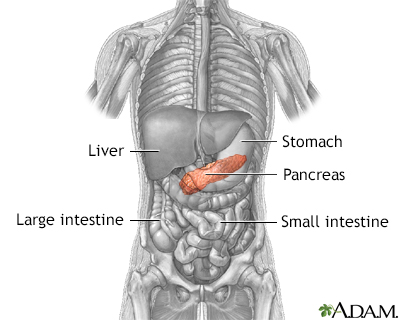Glucagonoma
Glucagonoma is a very rare tumor of islet cells of the pancreas, which leads to an excess of the hormone glucagon in the blood.
Causes
Glucagonoma is usually cancerous (malignant). The cancer tends to spread and get worse if not treated.
This cancer affects some of the islet cells of the pancreas. As a result, the affected islet cells produce too much of the hormone glucagon.
The cause is unknown. Genetic factors play a role in some cases. A family history of the syndrome multiple endocrine neoplasia type I (MEN I) is a risk factor.
Symptoms
Symptoms of glucagonoma may include any of the following:
- Glucose intolerance (body has problem breaking down sugars)
- High blood sugar (hyperglycemia)
- Diarrhea
- Excessive thirst (due to high blood sugar)
- Frequent urination (due to high blood sugar)
- Increased appetite
- Inflamed mouth and tongue
- Nighttime (nocturnal) urination
- Skin rash on face, abdomen, buttocks, or feet that comes and goes, and moves around (necrolytic migratory erythema)
- Weight loss
In most cases, the cancer has already spread to the liver when it is diagnosed.
Exams and Tests
Your health care provider will perform a physical exam and ask about your medical history and symptoms.
Tests that may be done include:
- CT scan of the abdomen
CT scan of the abdomen
An abdominal CT scan is an imaging test that uses x-rays to create cross-sectional pictures of the belly area. CT stands for computed tomography....
 ImageRead Article Now Book Mark Article
ImageRead Article Now Book Mark Article - Glucagon level in the blood
- Glucose level in the blood
Glucose level in the blood
A blood sugar test measures the amount of sugar (glucose) in a sample of your blood. Glucose is a major source of energy for most cells of the body, ...
 ImageRead Article Now Book Mark Article
ImageRead Article Now Book Mark Article - Genetic tests
Treatment
Surgery to remove the tumor before it spreads is usually recommended. Chemotherapy may be done when surgery is not possible.
Support Groups
You can ease the stress of illness by joining a cancer support group. Sharing with others who have common experiences and problems can help you not feel alone.
Cancer support group
The following organizations are good resources for information on cancer:American Cancer Society. Support and online communities. www. cancer. org/...
Read Article Now Book Mark ArticleOutlook (Prognosis)
Approximately 60% of these tumors are cancerous. It is common for this cancer to spread to the liver. Only about 20% of people can be cured with surgery.
If the tumor is only in the pancreas and surgery to remove it is successful, people have a 5-year survival rate of 85%.
Possible Complications
The cancer can spread to the liver. High blood sugar level can cause problems with metabolism and tissue damage.
When to Contact a Medical Professional
Contact your provider if you notice symptoms of glucagonoma.
Reviewed By
Sandeep K. Dhaliwal, MD, board-certified in Diabetes, Endocrinology, and Metabolism, Springfield, VA. Also reviewed by David C. Dugdale, MD, Medical Director, Brenda Conaway, Editorial Director, and the A.D.A.M. Editorial team.
Asban A, Patel AJ, Reddy S, Wang T, Balentine CJ, Chen H. Cancer of the endocrine system. In: Niederhuber JE, Armitage JO, Kastan MB, Doroshow JH, Tepper JE, eds. Abeloff's Clinical Oncology. 6th ed. Philadelphia, PA: Elsevier; 2020:chap 68.
National Cancer Institute website. Pancreatic neuroendocrine tumors (islet cell tumors) treatment (PDQ) - health professional version. www.cancer.gov/types/pancreatic/hp/pnet-treatment-pdq. Updated August 16, 2024. Accessed October 14, 2024.
Newey PJ, Thakker RV. Endocrine neoplasia syndromes. In: Melmed S, Auchus RJ, Goldfine AB, Rosen CJ, Kopp PA, eds. Williams Textbook of Endocrinology. 15th ed. Philadelphia, PA: Elsevier; 2025:chap 42.




